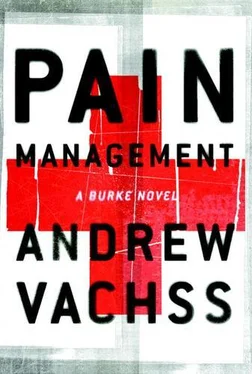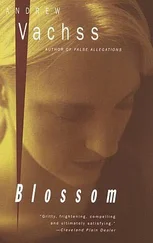Some chumps are more sophisticated than others. Gem gave me the readout on the father, said he was educated and intelligent. In our world, we know those are separate things—so we figured he wouldn’t be looking for something out of The Sopranos.
Besides, Gem let him think he was hiring an ex-mercenary, not an ex-con. For some reason, citizens think mercs are an honorable breed of outlaw. White citizens, anyway.
I pulled to the curb in front of their house in a two-year-old dark-gray Crown Vic sedan. I was wearing an off-the-rack navy-blue suit and generic tie, clean-shaven, with my hair cut military-short. I couldn’t do anything about my face, but it went nicely with the shoulder holster I’d make sure they got a good look at—it would help them convince themselves they were getting what they were paying for.
I gave the door a light two-knuckle rap. It opened so quickly I was sure my sense of having been watched from the window was on the money. The woman looked to be in her mid-forties, too thin for her age and frame, ash-blond hair carefully arranged to look casual, a salmon-colored dress belted at the waist with a silver chain, a matching set of links around her neck. Business pumps, sheer stockings, salon-level makeup. She had chemical eyes, but I couldn’t tell what was on her prescription pad.
“Are you—?” she said.
“Yes, ma’am. Our appointment was for—”
“I know, but my husband won’t be home for a couple of hours,” the woman said. “He had to work late, and he didn’t know how to reach you. . . .”
“That’s all right,” I said, stepping past her into a narrow hall. “I can get background from you, talk to him when he gets here.”
“Background? We already told the police everything.”
Didn’t her husband tell her me and the cops weren’t exactly colleagues? I kept my face expressionless, said, “Nobody ever does that,” and moved toward the living room, bringing her along in my wake.
“Does . . . what?” she asked me, her hands tightly clasped at her waist, as if she was afraid of wringing them.
“Tells anyone ‘everything.’ There’s no such thing.”
“What are you saying?”
“Not what you think,” I told her. “This isn’t about you ‘cooperating.’ You’re not a suspect. But one thing I learned from doing this for so long—until you really take them through it, people don’t know what they know.”
“I don’t under—”
“Here’s what that means,” I interrupted her, helping myself to a seat in a Danish-modern chair opulently padded in black leather. “You have information. You might not see it as information, but I would. It’s never the fault of the . . . source. It always comes down to the investigator not asking the right questions.”
“And that’s what you do?” she said, seating herself delicately on a love seat upholstered in what looked like tapestry cloth. If my chair suggested money, hers bludgeoned you with it.
Behind her was a giant blowup of the famous photograph of a young woman kneeling next to the body of a demonstrator gunned down by the National Guard at Kent State.
“It’s part of what I do,” I told her, more convinced than ever that her husband had told her I was some kind of “alternative” to the police, not the working thug he’d known he was hiring. “Because I don’t have the same handicaps as the police, I can work differently.”
“What . . . handicaps?”
“Cops have bosses. They have to answer for their stats. But, mostly, they’re prisoners of their minds.”
“Prisoners of their—?”
“Cops don’t believe anyone actually runs away, ma’am. In their mind, the bodies are always in the basement.”
Two sharp dots of brutal red burst out on her cheeks. She made a swallowing sound, reached out with one hand as if she’d lost her balance. I didn’t move. Her hand found the arm of the love seat. She gathered herself slowly, eyes on the carpet.
“How could they—?”
“It’s nothing personal,” I said gently. “That’s what I mean by them being prisoners of their minds. You can’t expect them to overcome their conditioning.”
“But they didn’t act like that at all, ” she said, an undercurrent of something like resentment in her voice. “They were almost . . . I don’t know . . . dismissive, perhaps. The only thing they seemed really interested in was that damn computer.”
“You mean your daughter’s . . . ?”
“Yes. As soon as they found out she was online, they got very excited. They even got some specialist to examine it. He did a . . . ‘hard-drive sweep,’ I think they called it.”
“Sure. Thinking maybe she got lured away by someone she met in a chat room.”
“That’s exactly what they said. But after they got done with the computer, they said there was nothing. They asked us about her friends, her teachers . . . but you could see their hearts weren’t in it.”
“How did they leave it, then?”
“They have Rose listed as a runaway. No evidence of foul play, that’s what they said. One of them told us she’d probably turn up. The other didn’t even seem to care that much.”
“You expected . . . ?”
“More,” she said, somewhere between bitter and disappointed. “I expected . . . more.” She took a shallow breath, switched to a singsong voice, as if she were answering stupid questions: “No, our daughter was not a Goth, not a drug addict, not an alcoholic. No, our daughter was not involved with someone we didn’t approve of. No, our daughter was not adopted . . . although why they thought that was important, I’ll never know.”
“Kids . . . teenagers—they’re natural seekers. Adopted children sometimes get this romantic notion about their ‘real’ parents, especially when they hit puberty and start to have social problems. They get the idea that DNA can explain things happening in their lives. If they ask their adoptive parents questions, and don’t get the answers they’re looking for, sometimes they go looking for themselves. That’s all they meant.”
“Oh. Well, they said all the right things. They just didn’t seem truly . . . concerned, I guess.”
“Concern’s just window dressing,” I said. “It might make you feel better, but it wouldn’t make them do a better job.”
“My husband didn’t trust them.”
“Because . . . ?”
“Kevin doesn’t trust the police,” she said, making an apologetic noise in her throat.
“Any special reason?”
“He was almost forty when Rose was born,” she said, as if that explained everything. When my expression told her it didn’t, she went on: “Kevin was an antiwar activist.”
“Ah. And now?”
“Now he’s an architect,” she said, pride rich in her voice. “A very fine one. With a very prestigious firm. But I wish he’d go out on his own.”
“You sound as if that’s something you’ve discussed more than a couple of times.”
This time her laugh came from her chest. “Only about once a night for ten years. But Kevin makes so much money where he is. . . .”
“Did your daughter ever get involved in those arguments?”
“Rose? Don’t be silly. And they weren’t arguments. I just think Kevin could do better for himself professionally. Be more creative, choose his own projects. But he’s more comfortable where he is.”
“All right,” I said, deliberately moving her away from any domestic unhappiness. “Could I have a look at Rose’s room?”
“I . . . Kevin hated that.”
“Letting the police search her room?”
“Yes. He said it was an invasion of Rose’s privacy. We would never do such a thing ourselves. So it seemed . . . bizarre . . . that we would let anyone else do it.”
Читать дальше











